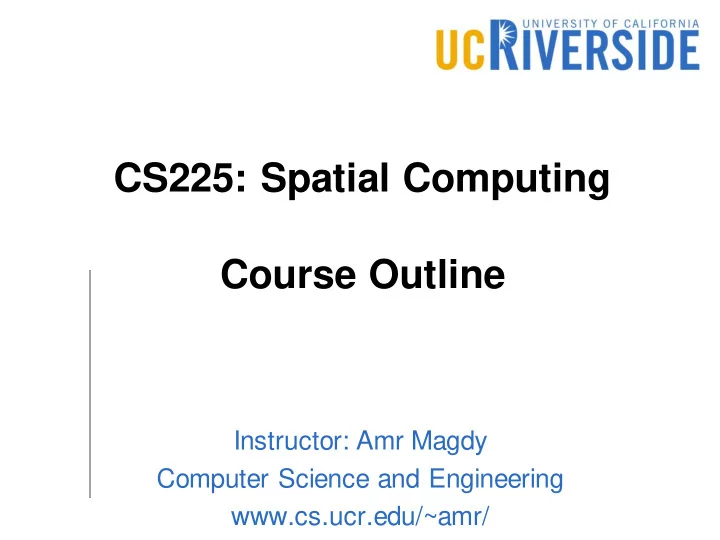

CS225: Spatial Computing Course Outline Instructor: Amr Magdy Computer Science and Engineering www.cs.ucr.edu/~amr/
Welcome to CS 225 Instructor : Amr Magdy Office: Tomas Rivera Library, 159B http://www.cs.ucr.edu/~amr/ Email: amr@cs.ucr.edu ( Include [CS225] in the subject – no spaces ) Office hours [tentative]: TT: 2:30 - 3:30 PM TA : Mayur Patil Office hours: TBA Email: mpati005@ucr.edu Reader : Gyan Prakash Email: gprak001@ucr.edu Course Website: https://www.cs.ucr.edu/~amr/#teaching 2
Course Content Introduction to Spatial Computing Spatial Relationships and Data Models Spatial Data Storage and Indexing Spatial Query Processing Spatial Networks Geo-visualization Spatial Data Mining Trends and Innovations in Spatial Applications 3
Course Content Course Research Elements: "Introduction to Research" lecture Surveying the literature methodology Paper reviews practice Presenting research papers Writing technical papers (survey and/or final report) Project stages (identifying idea, literature survey, tackling the problem, and documenting the results) Lecture contents on new trends on spatial-related research 4
Grading and Policies Course work Project (65%) Hands-on on spatial technologies (7.5%) Class participation (Evaluating others) (5%) Paper reviews (7.5%) Mini-topics Presentations (10%) Final exam (5%) Delivery policies: Groups of 3-4 students required for the project. Delivery instructions and policies announced per assignment. Cheating is not allowed and will be reported If you are using any external source, you must cite it and clarify what exactly got out of it. 5 You are expected to understand any source you use.
Project: Grade Breakdown Idea Proposal (with potential revision cycles) (5%) extra credit up to 10% for exceptional ideas and above-average quality ideas Outline of project deliverables Literature survey (10%) Project deliverables (35%) Final report, presentation, and discussion (15%) 6
Project: Categories Novel Research Preliminary investigation for a novel research idea Literature Survey Paper Surveying the literature of a certain spatial topic Literature Experimental Evaluation Experimentally compare major techniques of a certain spatial topic Vision Analysis Track the advances in topics of a vision report (e.g., CCC Spatial Computing 2020 Workshop) Interdisciplinary project Apply spatial computing technologies to a non-CS field Spatial Application Apply spatial technologies to a real use case. 7
Project: Deliverables and Assessment Novel Research Clearly identifying and presenting the research elements Preliminary solution idea Preliminary evaluation results Literature Survey Paper Comprehensive list of papers Literature classification/taxonomy Manuscript quality (writing, figures, organization,...etc) Literature Experimental Evaluation Long and short lists of papers Evaluation outline and corresponding implementations from the short list (or a subset) Evaluation results 8
Project: Deliverables and Assessment Vision Analysis Itemized analysis of the vision report Quality of surveying work on each topic Interdisciplinary Project Clear problem definition and importance Survey of related work Quality of the main deliverable, e.g., script, program, etc Spatial application Quality of the delivered software modules 9
Paper Reviews and Presentations Two review assignment (7.5%) Summarization of paper research elements Paper critique Mini-topics presentations (10%) Group-based topic preparations (titles and tentative outlines provided). Each group member must present. Involve presenting research papers as well as relevant articles. Open for new title suggestions. 10
Hands-on on Spatial Technologies Any spatial technology is fine, check instructor approval Any reasonable-sized hands-on is fine as well Candidate technologies Spatial Databases PostGIS, Oracle Spatial, SpatiaLite, MonetDB/GIS, etc GIS Software ArcGIS, QGIS, etc Maps Google Maps, Bing Maps, ESRI Maps, etc ESRI Story Maps Big Spatial Data Systems Simba, SpatialHadoop, GeoSpark, SpatialSpark, etc GeoSpatial Analysis Tools PySAL, GeoPandas, Fiona, Shapely, GeoDa, SSN & STARS, 11 SP and SF R packages, OGR GDAL
Final Exam Lectures content 12
Sample Survey Papers In-Memory Big Data Management and Processing: A Survey. Hao Zhang, Gang Chen, Beng Chin Ooi, Kian- Lee Tan, and Meihui Zhang. TKDE, vol. 27, no. 7. A survey of top-k query processing techniques in relational database systems. Ihab F. Ilyas, George Beskales, Mohamed A. Soliman. ACM Computing Surveys (CSUR), Vol. 40, Issue 4, No. 11, Oc. 2008. Crowdsourced Data Management: A Survey. Guoliang Li, Jiannan Wang, Yudian Zheng, Michael J. Franklin. TKDE, vol. 28, issue 9. 13
Suggested Projects Literature Surveys Scalable Techniques for Kriging Spatial Interpolation 1. Spatial operations using doubly connected edge lists (DCELs). 2. Spatial Applications on Multi-scale Geographically Weighted 3. Regression (MGWR) 14
Suggested Projects Spatial Applications (Real use cases in UCR) Irrigation status app Purpose: Display status of irrigation blocks, record duration of irrigation events and technicians responsible. Core functionality App will display on web map: Irrigation blocks currently being irrigated. Date/time of next scheduled irrigation by block of blocks not being irrigated. Irrigation technician responsible for Irrigation. Record date and time of irrigation started and ended by block; calculate duration. 15
Suggested Projects Spatial Applications (Real use cases in UCR) Pesticide application app Purpose: Display where pesticides have been and will be applied and records pesticide applications. Core functionality App will display on web map: Locations that have been treated with a pesticide, include name if selected. Locations currently under REI, Locations scheduled for pesticide application, include name if selected. Tentative date/time of scheduled applications. Record pesticide applications by treatment block, include pesticide name and treatment end date/time. 16
Suggested Projects ESRI GeoAI tools ArcGIS and Microsoft AI: Scalable GeoAI in the Cloud https://www.youtube.com/watch?v=m7GqaC5_fFU Geo Artificial Intelligence GeoAI medium blogs GeoAI Demonstration Gallery Geospatial Data Science Spatial Analysis and Data Science R-ArcGIS Bridge Bridging Into New Realms: R-ArcGIS Bridge and Microsoft R R Notebooks in ArcGIS Pro for Spatial Data Science ArcGIS API for Python – A powerful python library for spatial analysis, mapping and GIS 17
Suggested Projects ESRI GeoAI tools Online Lessons: Use Deep Learning to Assess Palm Tree Health Extracting Information using Image classification Downscale Climate Data with Machine Learning Predict Seagrass Habitats with Machine Learning Identify and Ecological Niche for African Buffalo (with R- ArcGIS Bridge) Analyze Crime using Statistics and R-ArcGIS Bridge Analyzing violet crime using hot spot analysis and space time cube 18
Credits Prof. Shashi Shekhar course http://www.spatial.cs.umn.edu/Courses/Spring18/8715/index.php 19
Recommend
More recommend